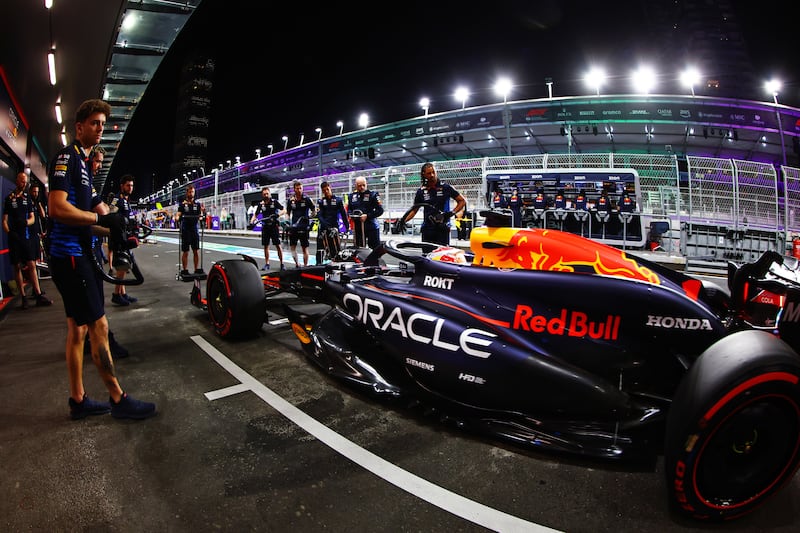The artificial intelligence revolution is starting to score big in the sports world by boosting player analytics and revenue generation for organisations, and providing a level playing field for app developers, analysts say.
Generative AI, in particular, is giving more incentives for sporting bodies to invest in next-generation technology, expected to help them broaden their reach in an industry that is rapidly evolving.
The ramifications of these investments are also felt in overall economic activity, Melih Murat, an associate research director at the International Data Corporation, told The National.
"A strong sports industry that is globally competitive will attract new business opportunities, such as hosting major sports events, which in turn will create new revenue opportunities not only for the sports industry, but also for the local businesses such as restaurants and hotels," Mr Murat said.
The AI in sport market is projected to grow significantly, hitting nearly $21 billion in 2029 from an estimated $5.93 billion in 2024, at a compound annual rate of almost 30 per cent, data from Mordor Intelligence shows.
"We will see a drive to secure early benefits from the production of AI hard and software," Simon Chadwick, a professor of sport and geopolitical economy at the Skema Business School in Paris, told The National.
"This helps to create competitive advantage, which in turn leads to job creation, income generation, export earnings and tax revenues."
Driving returns
Several AI applications are already being used in the industry.
On the app of Germany's Bundesliga, AI-driven personalisation led to a 17 per cent rise in time spent and an average 23 per cent more sessions for each user, according to Giovanni Sisinna, director of programme management at ISA Digital Consulting in Rome.
"Engagement is a cognitive-behavioural process that requires sports to understand the interaction between motives, perceptions, attitudes and behaviours," Mr Chadwick said.
"In seeking to build engagement, sports are essentially attempting to get them and keep them; in other words, turning prospective consumers into lifelong fans.
"Lifelong fans are a source of sustainable income. Try totalling up the value of match tickets and merchandise that a typical fan buys."
In Formula One, Amazon Web Services uses 300 sensors on each F1 race car to generate more than 1.1 million data points a second transmitted from the cars to their pits, showing how they perform.
This, in turn, allows F1 teams to run aerodynamic simulations to develop their next-generation cars, that are up to 70 per cent faster, AWS said in a blog.
"The attractiveness of AI influencing how sports will be held and covered will likely lead to more athletes competing at a higher level," Jad Haddad, head of digital for India, the Middle East and Africa at consultancy Oliver Wyman, told The National.
"And increased fan engagement could boost sports financials and employment opportunities."
Jobs pitch
AI is also helping to create opportunities for employment and supporting developers who create apps that aid in boosting analytics, engagement and performance.
The fear of people losing their jobs to AI may be a bit overblown, as the technology is also creating new roles, especially within sports organisations, Mr Murat said.
"It is fair to say that AI will not take jobs away but create employment opportunities for new skills," he said.
"Sports organisations should certainly have transformation programmes in place to ensure that their employees are upskilled or reskilled to leverage these technologies most effectively."
For developers, the opportunity lies in alternative technologies that track statistics and analyse data, which are likely to be more cost-effective than traditional, expensive equipment.
Smartphones, in particular, are already being used in tennis matches for this purpose.
"It would be a lot more accurate and it would be like a tenth of the cost," Swupnil Sahai, co-founder and chief executive of SwingVision, told The National.
The California start-up uses Apple iPhones on tennis courts to track matches and relay the data it gathers to its app on iPhones and Apple Watches.
The National took part in a match that used an iPhone and iPad.
"If you look at the 10-camera system, in addition to those 10 cameras, they have a gigantic server underneath the court processing everything," Mr Sahai said.
He was referring to the Hawk-Eye computer vision technology used in sports such as tennis, football, rugby, volleyball and cricket to track the trajectory of balls.
SwingVision, backed by former US tennis star Andy Roddick, claims that the shot speeds it tracks are accurate to within 10 per cent and line-calling is 97 per cent accurate for close calls landing within 10cm of a line.
Hawk-Eye is accurate up to 5mm with a 2.2mm margin for error.
"Just think about how old that is compared to something like everything in one device that feels where [the ball is] going to go," Mr Sahai said.
The company plans to bring SwingVision to the Middle East, with Dubai as a possible first stop.
"It would be so much more affordable for tournaments and be fully automated," Mr Sahai said.
The sports industry is expected to continue adopting new AI technology.
But while there is an early adopter speculative boom in sports AI investments, the market is still young and developing, Mr Chadwick said.
"Sport will not be able to resist the onset of AI, as the speculative investment suggests, but the precise way in which sport will embrace and be shaped by AI remains to be seen."
Watch how Red Bull celebrated Verstappen's Abu Dhabi Grand Prix win







